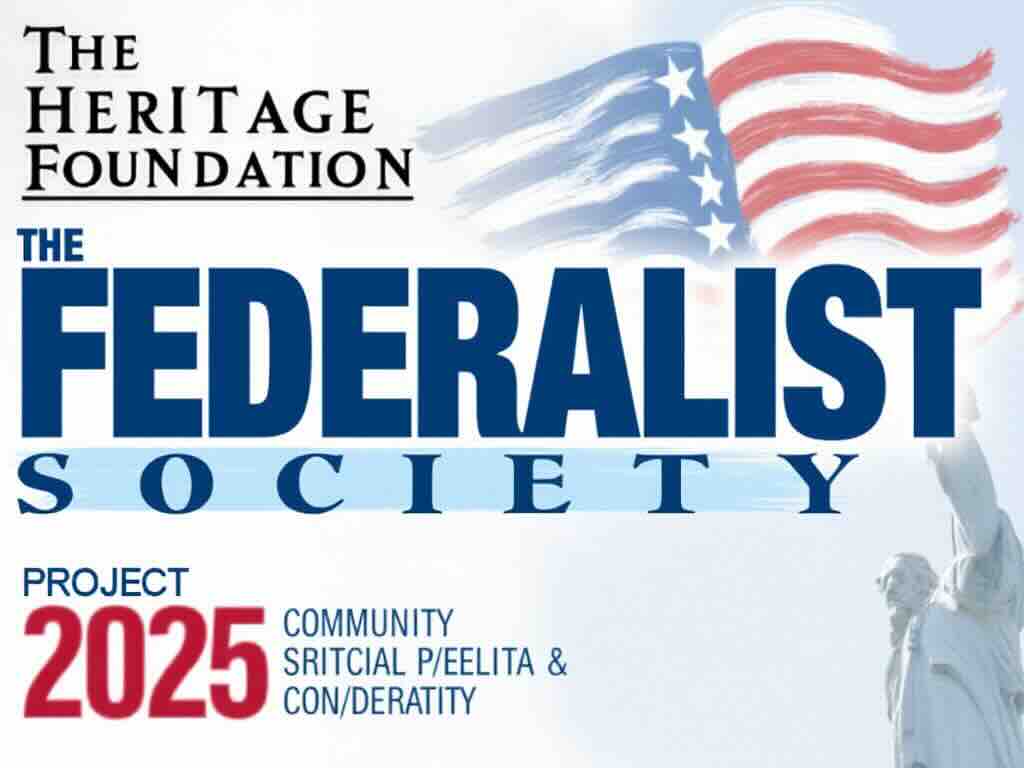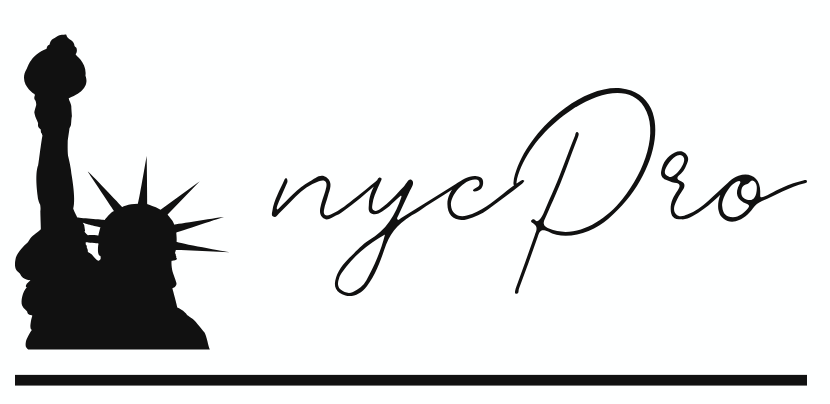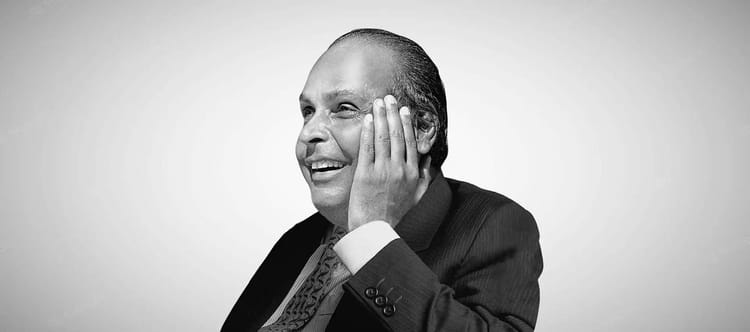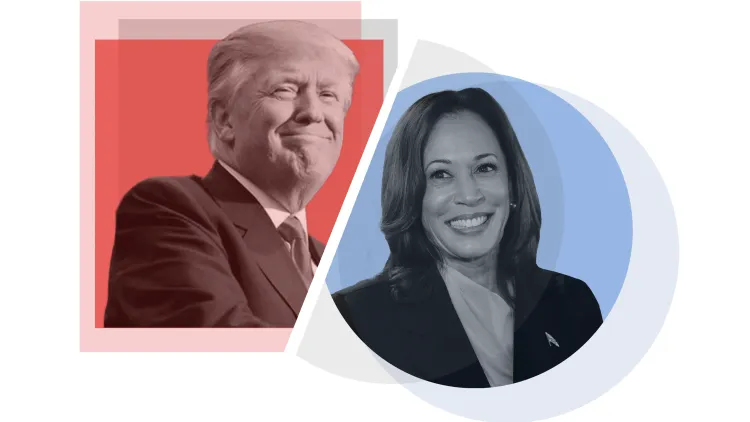The Heritage Foundation, The Federalist Society, Donald Trump, and the GOP: Unpacking Their Influence on America’s Political Landscape

In recent years, the confluence of right-leaning think tanks like The Heritage Foundation, legal advocacy organizations such as The Federalist Society, political figures like Donald Trump, and the Republican Party (GOP) has had a profound impact on the political and social fabric of the United States. While each of these entities plays a distinct role in the conservative movement, their coordinated efforts have shaped policy, judiciary appointments, and the broader ideological direction of the GOP. This article explores the intersections between these influential players, highlighting how their activities and agendas have contributed to significant changes in American governance, with critical implications for democracy, judicial impartiality, and societal cohesion.
The Heritage Foundation: The Ideological Architect
Founded in 1973, The Heritage Foundation is a conservative think tank that has played a pivotal role in shaping Republican policy. It aims to promote limited government, free-market economics, and traditional values. During the Reagan administration, Heritage solidified its status as a leading influence on conservative policymaking, drafting policy blueprints like Mandate for Leadership, which became instrumental in guiding Reagan’s agenda.
The organization’s influence extends beyond policy formulation. It has served as a training ground for conservative operatives and policymakers, ensuring that the values it champions—such as deregulation, tax cuts, and a pro-business stance—are consistently woven into the fabric of the Republican agenda. The Heritage Foundation's policy recommendations have been key to shaping legislation, including major tax reforms under GOP administrations. However, critics argue that its staunch advocacy for reduced government oversight and deregulation has favored corporate interests over public welfare, widening economic disparities in the process.
The Federalist Society: Shaping the Judiciary
The Federalist Society, founded in 1982, operates as a powerful network of conservative lawyers, judges, and legal scholars. Its core mission is to reshape American jurisprudence through a philosophy of textualism and originalism, emphasizing a strict interpretation of the Constitution. While this might sound purely academic, the society's reach is far more practical: it has become the gatekeeper for federal judicial nominations under Republican administrations.
Donald Trump’s presidency marked a watershed moment for The Federalist Society’s influence. With the society's recommendations, Trump appointed over 200 federal judges, including three Supreme Court justices—Neil Gorsuch, Brett Kavanaugh, and Amy Coney Barrett. These appointments have reshaped the judiciary, solidifying a conservative majority that has significant implications for rulings on reproductive rights, gun control, voting laws, and more.
Critics argue that The Federalist Society’s influence has compromised the impartiality of the judiciary, turning it into an arena for ideological battles rather than a neutral arbiter of justice. With lifetime appointments, the impact of these decisions will resonate for decades, potentially constraining the ability of future administrations to implement progressive policies.
Donald Trump: Amplifying and Operationalizing Conservative Agendas
Donald Trump’s rise to political prominence in 2016 redefined the Republican Party, pivoting it towards a more populist, anti-establishment, and often authoritarian stance. While many observers initially viewed Trump as an outsider to traditional conservative institutions, his presidency quickly became a vessel for the policies championed by The Heritage Foundation and The Federalist Society. Trump’s administration eagerly embraced Heritage’s policy prescriptions, from tax cuts and deregulation to a hardline stance on immigration.
Trump’s alignment with The Federalist Society in judicial appointments underscores the synergy between these conservative entities. Beyond policy, Trump’s rhetoric and actions—such as challenging the results of the 2020 presidential election—have contributed to an erosion of public trust in democratic processes. His claims of widespread voter fraud, which culminated in the January 6th Capitol insurrection, have emboldened a faction of the GOP that is increasingly skeptical of electoral legitimacy and supportive of measures that restrict voting rights.
The GOP: A Shift to the Right
The Republican Party has evolved significantly over the past few decades, with a marked shift towards the right, particularly in its embrace of Trumpian populism. The GOP's transformation can be attributed to the influence of The Heritage Foundation and The Federalist Society, as well as Trump’s ability to galvanize the party base around anti-elite and anti-immigrant rhetoric.
Trump’s hold over the party has been so strong that many GOP lawmakers remain unwilling to challenge him or the conspiracy theories he has propagated. The party’s embrace of these narratives has led to legislative actions aimed at restricting voting access—seen in states like Georgia and Texas—and gerrymandering efforts to cement political power. These tactics threaten the democratic principle of fair representation, creating systemic barriers for minority groups and other marginalized communities.
The Harmful Impact on the Nation
The alignment of The Heritage Foundation, The Federalist Society, Donald Trump, and the GOP has had significant repercussions on American democracy, economic stability, and social cohesion. Here are some of the key areas of concern:
- Erosion of Democratic Norms: The questioning of electoral integrity, driven by Trump’s baseless claims of voter fraud and the GOP’s subsequent adoption of restrictive voting laws, threatens the foundational principles of American democracy. The focus on so-called “election security” has become a pretext for enacting policies that disproportionately affect minority voters, undermining the democratic process.
- Judicial Overreach: The long-term impact of a judiciary shaped by The Federalist Society is already evident in key Supreme Court decisions, such as the overturning of Roe v. Wade and the weakening of the Voting Rights Act. These rulings have reshaped fundamental rights and protections, often in ways that roll back progressive gains. The focus on originalism and textualism, while framed as adherence to the Constitution, has often aligned with conservative social values, affecting the rights of marginalized communities.
- Economic Inequality: The Heritage Foundation’s advocacy for tax cuts and deregulation, adopted by Trump’s administration, has exacerbated wealth disparities in the United States. While corporate profits and stock markets have seen growth, the benefits have not trickled down equitably, leading to a concentration of wealth among the affluent. This has contributed to a weakening of the middle class, with policies that often prioritize short-term economic gains over long-term investment in social safety nets and public services.
- Polarization and Extremism: Trump’s rhetoric and the GOP’s embrace of cultural wars have intensified political polarization, making bipartisan cooperation increasingly difficult. Issues like immigration, critical race theory, and LGBTQ+ rights have been weaponized to rally the conservative base, creating deeper divides within American society. This polarization has emboldened extremist elements, as seen in the rise of white nationalist groups and conspiracy theories like QAnon, which pose a tangible threat to social cohesion and public safety.
Damage Thus Far
- Overturning of Roe v. Wade: Stripped federal protections for abortion rights, leading to restricted access to reproductive healthcare in many states and curtailing women's autonomy over their bodies.
- Assault on Women's Rights: New state-level bans and restrictions on abortion undermine women's rights to make personal medical decisions.
- Voter Suppression Laws: Enacted in several states, these laws target minority groups, reduce access to voting, and undermine democratic participation.
- Judicial Bias: Federal courts, particularly the Supreme Court, have been stacked with conservative judges, leading to decisions that reflect partisan interests rather than impartial legal reasoning.
- Political Polarization: Intensified divisions fueled by extreme rhetoric and culture wars, making it harder to achieve bipartisan solutions.
- Economic Inequality: Policies favoring tax cuts for the wealthy have increased the wealth gap, weakening the middle class and leaving many behind.
- Misinformation and Conspiracy Theories: Proliferation of false narratives, such as election fraud claims, has eroded trust in democratic institutions.
- Anti-LGBTQ+ Legislation: Restrictive laws and rhetoric against LGBTQ+ communities have increased discrimination and limited rights, especially for transgender individuals.
- Climate Change Denial: Policies and rhetoric that dismiss scientific consensus on climate change hinder progress on critical environmental challenges.
- Erosion of Checks and Balances: Increasing concentration of power in the executive branch, particularly under Trump, has strained the traditional checks and balances system.
- Weaponization of Cultural Issues: Issues like critical race theory and immigration are used as political tools, deepening social divides.
- Decline in Trust in Institutions: Public trust in media, elections, and even the judicial system has significantly eroded, undermining societal cohesion.
- Corporate Influence on Legislation: Lobbying and influence from corporations and wealthy donors have skewed policy decisions, prioritizing profit over public welfare.
Heritage Foundation Agenda
- Promote Limited Government: Advocates for reduced federal government intervention in economic and social issues, emphasizing states' rights and individual freedoms.
- Free-Market Economics: Supports deregulation, lower taxes, and policies that encourage private enterprise and competition over government-controlled programs.
- Traditional Family Values: Endorses socially conservative positions, including opposition to same-sex marriage, restrictions on abortion, and support for religious liberty.
- Strong National Defense: Advocates for a robust military and foreign policy aimed at protecting American interests and maintaining global influence.
- Opposition to Expansive Social Programs: Seeks to reduce the size and scope of programs like Medicaid, welfare, and social security in favor of private sector solutions.
- Judicial Originalism: Supports the appointment of judges who interpret the Constitution according to its original meaning, limiting judicial activism.
- School Choice and Education Reform: Promotes charter schools, vouchers, and other initiatives that provide alternatives to traditional public schooling.
- Climate Change Skepticism: Opposes many regulatory efforts aimed at reducing carbon emissions, emphasizing economic growth over environmental policies.
Project 2025 Agenda
A strategic plan by The Heritage Foundation aimed at shaping the next conservative administration's policy agenda by providing a detailed blueprint for governance.
- Objective to Reshape Federal Agencies: Seeks to reduce the size and influence of federal agencies by cutting staff, curbing regulatory powers, and promoting conservative leadership across key institutions.
- Rollback of Environmental and Labor Regulations: Aims to dismantle policies related to climate action, environmental protections, and workers' rights in favor of industry-friendly deregulation.
- Promotion of Conservative Judicial Appointments: Focuses on continuing the appointment of judges with originalist and conservative philosophies to shape long-term judicial outcomes.
- Restriction of Abortion and Reproductive Rights: Advocates for federal and state-level policies to further restrict abortion access, effectively building on the momentum of the Roe v. Wade reversal.
- Limiting LGBTQ+ Rights: Supports policies that would restrict rights related to same-sex marriage and transgender rights, framing these as matters of religious freedom.
- Empowering State Control over Education: Pushes for increased state control over education, emphasizing the removal of progressive curricula and promoting school choice, including religious and charter schools.
- Strengthening Executive Power: Seeks to centralize power in the executive branch, allowing the president more direct control over policy implementation and federal agencies.
- Targeting Social Welfare Programs: Recommends reforms to limit social welfare programs, aiming to reduce federal spending on safety nets like Medicaid and food assistance.
- Bottom Line: Project 2025's core objective is to create a conservative governance framework that emphasizes limited government, traditional values, and deregulation, with specific aims to roll back gains in women's reproductive rights, LGBTQ+ protections, and climate action.
Project 2025 - In A Nutshell
What is The Heritage Foundation?
- A group that thinks up ideas to help make rules and laws in the United States.
- They focus on making the government smaller, supporting businesses, and traditional values like religion and family.
What is Project 2025?
- A plan by The Heritage Foundation to shape the future of the U.S. government.
- They want to make sure the next president has a team that follows their ideas and values.
What are the effects?
- Limits on Women's Rights: They support rules that make it harder for women to choose what to do with their own health, like limiting access to abortion.
- Less Help for the Poor: By making the government smaller, there might be less support for programs that help people who are struggling.
- More Power for Big Businesses: Fewer rules could mean that big companies have too much power and don't always think about what's best for people.
- Judges with One Point of View: They want judges who agree with their ideas, which might mean that the laws they make are not fair to everyone.
What "Traditional Values" means?
"Traditional Values" often aligns with a worldview that can be seen as favoring traditional, male-dominated roles in society.
- Focus on the Nuclear Family: Emphasizes the importance of a family structure with a married man and woman raising children, often placing the man as the head of the household.
- Religious Freedom: Supports the right for individuals and organizations to express their religious beliefs freely, often advocating for Christian values.
- Pro-Life Stance: Strong opposition to abortion, advocating for policies that protect unborn life and restrict access to abortion services, which limits women's choices over their own bodies.
- Opposition to Same-Sex Marriage: Believes that marriage should be defined as a union between one man and one woman, restricting rights for LGBTQ+ communities.
- Parental Rights in Education: Advocates for parents' rights to decide what their children learn in school, including the promotion of school choice and opposition to progressive curricula.
- Patriotism and National Pride: Encourages respect for the nation’s history, traditions, and symbols, such as the flag and the Constitution.
- Personal Responsibility: Emphasizes individual responsibility and accountability for one’s actions as a foundation for a strong society.
- Traditional Gender Roles: Supports roles where men are often seen as providers and leaders, and women as caregivers within the family unit, reinforcing a “man’s world” perspective where men hold primary authority.
Key People
- Kevin Roberts: President of The Heritage Foundation, leading the strategic vision for Project 2025, emphasizing a conservative policy agenda for the next administration.
- Paul Dans: Director of Project 2025, tasked with coordinating efforts to recruit conservative personnel and provide training for future roles within federal agencies.
- Ed Corrigan: Former White House personnel director under Donald Trump, heavily involved in Project 2025’s focus on placing ideologically aligned individuals in key federal roles.
- Genevieve Wood: Senior Advisor at The Heritage Foundation and a vocal advocate for the organization’s conservative values, including efforts to influence public opinion around issues like abortion and education.
- Mike Howell: Director of the Oversight Project at Heritage, focusing on reducing the influence of federal agencies and promoting oversight of progressive policies.
- Roger Severino: Former Trump administration official and key figure in advocating for restrictions on abortion and LGBTQ+ rights, now involved in shaping Project 2025’s policies on health and human services.
- Ken Cuccinelli: Former acting Deputy Secretary of Homeland Security under Trump, contributing to Project 2025’s emphasis on immigration restrictions and border security.
- Mark Meadows: Former White House Chief of Staff under Trump, aligning with Project 2025’s agenda to streamline conservative priorities in future Republican leadership.
- Leonard Leo: Influential figure in The Federalist Society, collaborating closely with The Heritage Foundation to ensure judicial appointments that align with Project 2025's conservative objectives.
- Jim DeMint: Former U.S. Senator and ex-president of The Heritage Foundation, whose legacy influences the direction of Project 2025 with a focus on conservative governance and policy-making.
Conclusion
The partnership between The Heritage Foundation, The Federalist Society, Donald Trump, and the GOP represents a powerful alliance that has reshaped the political landscape of the United States. While their efforts have succeeded in advancing conservative goals, they have also raised profound concerns about the health of American democracy, the impartiality of the judiciary, and the equitable distribution of economic resources.
This convergence has contributed to an environment where democratic norms are under threat, judicial decisions often reflect ideological biases, and economic policies exacerbate disparities. Addressing these challenges requires a critical examination of the systems and narratives that have allowed such concentrated influence to persist. As Americans grapple with these shifts, it is essential to remain vigilant about the balance of power and the protection of democratic values, ensuring that the nation’s future remains inclusive and just for all its citizens.




